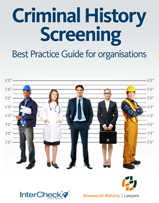Conducting criminal history checks for existing or potential new staff is now becoming common practice in Australia.
For many industries, conducting criminal history checks is a mandatory requirement, however, in recent years there has been a significant increase in the number of criminal history checks conducted as more organisations conduct criminal history checks as a proactive measure as part of their risk management process. The benefits include promoting a safe working environment, mitigating risks to the organisation and protecting the people, property and reputation of an organisation.
I. Conducting Police Checks on Potential Employees
Once an organisation has decided to conduct criminal history checks for a specific role following a comprehensive risk assessment, the following steps should be taken:
1. Formulate a Criminal History Check Policy
Before you start conducting checks your organisation you should have a documented Police check policy in place, which will help potential candidates and employees fully understand your organisation’s objective in conducting police checks and help avoid any misunderstandings.
2. State the requirement for the police checks on the job advertisement.
It is also recommended to state on the advertisement that a criminal history does not automatically bar people from applying. This then allows for an open and honest discussion in the early stages of the recruitment process.
3. Explain the requirement for a police check clearly during the interview.
During the interview, it should be reiterated that the role requires the applicant to consent to a police check, based on the risks that are inherent with the role and that any criminal record will be assessed against those risks.
4. Conduct police checks on the preferred or shortlisted candidates.
This will avoid the cost and the administrative burden of organising police checks for unsuccessful applicants and will also avoid the risk of confidential information being disclosed unnecessarily.
II. Conducting Police Checks on Existing Employees:
In certain industries, mandatory Criminal history checks may be required due to legislation. Mandatory police checks are usually completed at the pre-employment stage and periodically depending on the industry requirements. Employers should be aware of any such industry-specific requirements and ensure policies should be in place in order to comply with the requirements.
If an existing employee is moving into a role with a different level of risk and it has been established that a police check is required because of those risks, then you should ensure that the employee completes a police check before changing roles.
If they have an existing clearance, you need to consider when the certificate was issued and if the check covers the specific risks of that role. For example, if the employee being promoted has a police certificate for the purpose of “access to sensitive information” and they are being placed into a role with direct care of vulnerable people, then the original police check would not cover the new role and an updated police check is required specifying the new role.
If the existing employee has been in a role that did not require a police check at the outset, then you should explain to them that the new role has different levels of risks and explain to them why a police check needs to be obtained before they can be placed into the new role.
“Employers do not normally conduct police checks on existing employees if there is no inherent risk to a specific role.”
III. Conducting Police Checks on Existing Employees - with no change of role
If your business has no existing criminal history screening program in place and intends to establish a new program, (or it becomes a mandatory requirement) then there must be careful planning put in place before commencing any program and before announcing the program to existing staff. If not approached in the correct manner there may be some resentment by existing staff and you may encounter problems that could easily have been avoided with some careful planning in the initial stage.
Firstly the need to conduct the police checks should be justifiable and established due to either a risk assessment within specific roles or due to a change in the law or regulations for a particular industry and/or a specific role. An example would be a team of trade workers needing to work on a government site. In order to be granted access to work on any government site - there is a requirement that any 3rd party must present a police clearance before access can be granted. This reason would then be articulated to the employees who need to obtain the police check for that purpose.
Employers do not normally conduct police checks on existing employees if there is no inherent risk to a specific role. If an employer decides to conduct police checks on existing staff, but has not conducted a clear ’Risk assessment’ , or does not identify any inherent risks within the role then this may well cause resentment among staff and furthermore, this would open up the employer to potential legal risks themselves.
Announcing to existing employees that you will be conducting police checks is a delicate process. Some employees may feel threatened or that they have lost their employer’s confidence, especially if they have been employed in the organisation for some time.

It is, therefore, prudent to notify all employees that the organisation will be conducting police checks as part of the organisation’s wider risk management programme or due to a mandated requirement. This is an opportunity to explain why this new policy is being implemented, making it clear that police checks help mitigate the company’s risks and/or fulfil a mandated requirement.
It is best practice to inform your employees of the types of court outcomes that would attract an assessment of their suitability, assure them that having a criminal history does NOT automatically disqualify them from the position. You must also assure the employee that any result will be handled with the strictest confidentiality by senior management and will be assessed fairly on a case by case basis.
In summary, employers should communicate the following information as early as possible in the screening process to promote a positive environment which is conducive to an honest exchange of information between stakeholders:
a) The type of information disclosed by police checks, explaining that the laws in some states and territory prevent certain records from appearing in the results.
b) The protection afforded to spent convictions unless specifically required under legislation.
c) Your policy considerations behind conducting police checks, as stipulated in the company’s risk management policies.
d) The identified areas of crime relevant to the employee’s role within the organisation
e) The assessment process, including the consideration given to individual circumstances.
f) The staff members conducting the assessment.
g) The company’s confidentiality/ privacy policies and criminal record storage policies.
h) Their employment rights under the Fair Work and anti-discrimination legislation.
In addition, you should assure employees that they will be given the opportunity to dispute the police check results if they believe the record is incorrect. Furthermore, you should assure them that they will be given the opportunity to discuss any record if they wish to disclose further information to assist the employer in the assessment process.















